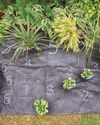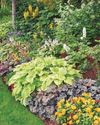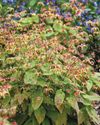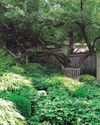
Luckily, there are many different ways to give your favorite fruits the help they need. Let’s talk about it!
WHY STAKE TOMATOES? If you’ve ever grown tomatoes, you’ve probably noticed by now that they can grow fine without support, but keeping them off the ground has its advantages. For starters, when tomatoes are staked, they’re less likely to be damaged by insects or diseases because they won’t be in contact with soil. Second, it’s a lot easier to see when the fruit is ripe and ready for harvesting. Third, you’ll free up more growing space. And finally, staking your tomato vines gives plants more access to sunlight and increases photosynthesis while also promoting air circulation, which helps prevent foliar fungal diseases, such as early blight.
MATCH THE SUPPORT TO THE PLANT There are two types of tomatoes: determinate and indeterminate. Determinate tomatoes are compact bush-type plants that stop growing at a certain height; fruits mature at the same time for a single harvest. Indeterminate tomatoes are tall vining plants with no determined height, so they keep growing throughout the season and produce fruits that mature at different times. The kind of support to provide your plants depends on what type of tomato you’re growing. Check the seed packet or plant label to see if it is determinate or indeterminate. Cages and stakes that are 3 to 4 feet tall are perfect for determinate tomatoes, while indeterminate types require support 5 to 7 feet tall or higher.
هذه القصة مأخوذة من طبعة Issue 175 - February 2024 من Garden Gate.
ابدأ النسخة التجريبية المجانية من Magzter GOLD لمدة 7 أيام للوصول إلى آلاف القصص المتميزة المنسقة وأكثر من 9,000 مجلة وصحيفة.
بالفعل مشترك ? تسجيل الدخول
هذه القصة مأخوذة من طبعة Issue 175 - February 2024 من Garden Gate.
ابدأ النسخة التجريبية المجانية من Magzter GOLD لمدة 7 أيام للوصول إلى آلاف القصص المتميزة المنسقة وأكثر من 9,000 مجلة وصحيفة.
بالفعل مشترك? تسجيل الدخول

Backyard Tornado
\"HE WHO SEARCHES FOR SPRING WITH HIS KNEES IN THE MUD FINDS IT, IN ABUNDANCE.\" - ALDO LEOPOLD

Front-of-the-Border "Wow!" Power
When it comes to easy-care plants that bring a lot of punch to the border, 'Ivory Queen' Turkestan onion should be near the top of your shopping list.

GARDEN ESSENTIALS
MAKE GARDENING EASIER THIS YEAR

Elevate an Evergreen Hedge
Although an evergreen hedge looks suitable all year on its own, it's perfectly poised to become something even greater: a backdrop to a garden where flower after flower will unfurl with such drama, you just might find yourself stepping outside and offering your applause.

One Garden, Two Worlds
In this colorful and welcoming garden, sunny, flower-filled front borders transition to a shady backyard hideaway.

on edge
Four garden pros share their go-to edging techniques.

DIANTHUS
Add fragrance, vivid color and timeless charm with this reliable, cold-hardy perennial.

2025's Best New Plants!
Are you ready to start planning for next year's garden? A few new plants might be just what you need to bring those dreams to reality.

Solve Garden Problems With Ground Covers
Are you tired of coaxing turfgrass to grow in difficult spots? In her book Groundcover Revolution, Kathy Jentz says that ground covers can be the solution to these struggles.

The Romance of Spring
With the arrival of spring, emerging perennials fill the garden with soft texture, restoring life to the harsh, often barren landscape of winter.